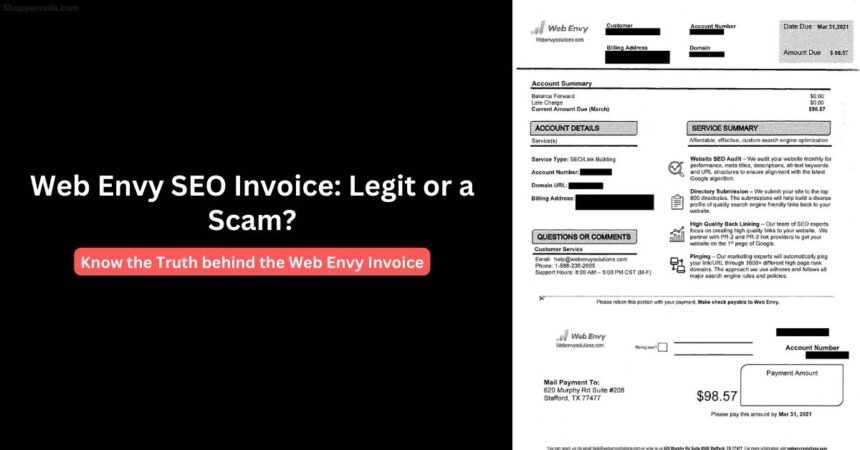Small business owners across the country are once again facing a sophisticated invoice scam that first emerged in 2021 and has made an alarming resurgence in early 2024. The operation, running under the name “Web Envy Solutions,” has been sending professional-looking invoices for SEO and link-building services that were never ordered or performed. As businesses struggle with tightening margins and increasingly complex digital marketing requirements, this scam preys on both confusion and the common business practice of quickly settling small invoices to avoid disruption.
The Return of a Sophisticated Scheme, Web Envy Invoice Scam
The Web Envy scam follows a deceptively simple formula: target small businesses with fake invoices for “SEO/Link Building” services, typically charging exactly $98.57—an amount carefully calculated to be large enough to be profitable for scammers but small enough that many businesses might pay without thorough verification.
“These scammers understand business psychology,” explains Melanie Rodriguez, a cybersecurity analyst specializing in small business fraud. “They know that a sub-$100 invoice often falls below the threshold that triggers careful scrutiny in many organizations. It’s designed to slip through the cracks in accounting departments.”
What makes this scam particularly effective is its professional execution. The invoices arrive via PDF email attachments or even fax—a delivery method rarely used by modern cybercriminals but still common in legitimate business transactions. Each invoice includes authentic-looking elements: the target’s name, account number, domain information, and meticulously formatted payment sections.
Inside the Web Envy Operation
The fraudulent operation has built an impressive facade. The Web Envy website presents all the hallmarks of legitimacy, featuring professional design, detailed service descriptions, and multiple contact methods. Domain registration analysis shows the site was first created in March 2021, with a new version appearing in early 2024 for the recent campaign.
However, closer investigation reveals troubling inconsistencies. The phone number listed on invoices (1-888-236-2605) connects to a recording stating the number is no longer in service. The physical address provided (620 Murphy Rd Suite #208, Stafford, TX 77477) exists, but appears to be used across multiple questionable operations.
Perhaps most telling, security researchers have discovered that the Web Envy website is an almost exact duplicate of a commercial web design template, with minimal customization—some even report finding placeholder text and demo employee names still present on the site.
How the Web Envy SEO/Link Building Scam Works
The Web Envy operation follows a well-established playbook:
- Broad targeting: They send invoices to numerous small businesses simultaneously, knowing that even a small percentage of responses can generate significant returns.
- Multiple contacts: Within the same organization, different employees might receive identical invoices, increasing the chances that at least one will process payment without cross-checking with colleagues.
- Creating urgency: Invoices typically feature near-due dates, creating pressure to pay quickly to avoid potential late fees or service interruptions.
- Impressive service descriptions: Invoices detail seemingly valuable SEO services, including “Website SEO Audit,” “Directory Submission to top 800 directories,” “High Quality Back Linking,” and “Pinging through 1600+ high page rank domains”—language designed to sound technical and valuable to business owners concerned about their online visibility.
One victim, a boutique marketing agency owner who wished to remain anonymous, shared: “The invoice looked absolutely legitimate. It had our domain, an account number, and detailed services that sounded like something we might actually use. If our accountant hadn’t been vigilant about checking with our actual SEO provider, we might have paid it without thinking twice.”
Red Flags: Identifying SEO Invoice Scams
Learning to identify potential scams can protect your business from falling victim to Web Envy and similar operations. Key warning signs include:
- Invoices for services never ordered: The most obvious red flag is receiving an invoice from a company you’ve never worked with or contacted.
- Suspicious contact information: Non-working phone numbers, generic email addresses, or physical addresses that don’t align with the purported company size are potential indicators of fraud.
- Template-like materials: Look for evidence that documents, emails, or websites are simply modified templates rather than custom-built materials from an established business.
- Unusual errors or inconsistencies: The Web Envy invoices sometimes contain strange artifacts like a line reading “1. Non Nude AadiaW”—likely a remnant from a template they failed to fully customize.
- Exact, unusual amounts: Many scam invoices use the same specific amount ($98.57 in Web Envy’s case) across all targets, regardless of the business size or actual SEO needs.
- Vague or overpromising service descriptions: Claims like “get your website on the 1st page of Google” or submissions to “top 800 directories” are red flags as legitimate SEO services typically offer more realistic, measurable outcomes.
What to Do If You Receive a Suspicious Web Envy SEO Invoice
If you receive an invoice from Web Envy or a similar unfamiliar company, cybersecurity experts recommend the following steps:
- Don’t rush to pay: Take time to investigate the invoice thoroughly before making any payment decisions.
- Verify internally: Check with all departments who might legitimately contract SEO services to confirm whether anyone authorized the work.
- Research the company: Conduct basic due diligence by searching for company reviews, checking Better Business Bureau listings, and verifying how long their website has been operational.
- Contact through alternate means: If you wish to verify the legitimacy of an invoice, never use the contact information provided on the suspicious document itself. Instead, find the company through independent sources.
- Report the scam: File reports with the Federal Trade Commission (FTC), your state attorney general’s office, and the FBI’s Internet Crime Complaint Center (IC3).
“The most effective defense is skepticism,” notes Gregory Chen, director of small business protection at the National Cybersecurity Alliance. “Any unexpected invoice should trigger immediate questions, especially for services that are often outsourced like SEO, where business owners might not fully understand the technical details.”
If You’ve Already Paid a Fraudulent Invoice
Unfortunately, many businesses discover they’ve been scammed only after payment has been sent. If you’ve fallen victim to the Web Envy scam or similar fraud, take these steps immediately:
- Contact your financial institution: If you paid by credit card or check, contact your bank or credit card company immediately to report the fraud and possibly stop or reverse the payment.
- Document everything: Save all communications, invoices, and evidence of payment for law enforcement.
- Report to authorities: File detailed reports with the FTC at ReportFraud.ftc.gov and with the FBI’s IC3 at IC3.gov.
- Alert your network: Notify industry associations and business peers about the scam to prevent others from falling victim.
- Review internal processes: Use this as an opportunity to implement stronger verification procedures for all invoices, especially those from new vendors.
Recovery success often depends on how quickly you act. “The faster you report fraudulent payments, the better your chances of recovery,” explains financial fraud investigator Terrence Williams. “Many financial institutions have specific time windows for fraud claims, so immediate action is essential.”
Protecting Your Business from Future Scams
The Web Envy scam is just one example of the increasingly sophisticated frauds targeting small businesses. Implementing these preventative measures can help protect your organization:
- Establish clear procurement procedures: Ensure all service engagements, especially with new vendors, follow a documented approval process.
- Create an approved vendor list: Maintain and regularly update a list of authorized vendors for common services like SEO, web development, and digital marketing.
- Implement multiple verification steps: Require multiple approvals for new vendors and unusual invoices, especially for digital services.
- Educate all staff: Regular training on common scams should include everyone who might receive or process invoices.
- Verify before paying: Establish a policy of verifying all first-time vendor invoices through channels not provided in the invoice itself.
As digital marketing becomes increasingly essential for business success, scammers will continue targeting this area of confusion and necessity. The Web Envy operation demonstrates how sophisticated these schemes have become—and why vigilance must be a core business practice rather than an afterthought.
“The digital economy runs on trust,” concludes Rodriguez, “but that trust must be verified at every step. A healthy skepticism toward unexpected invoices isn’t just good cybersecurity—it’s essential business practice in 2025.”
For more information on protecting your business from invoice scams, visit the Federal Trade Commission’s business guidance section at ftc.gov/business.


























